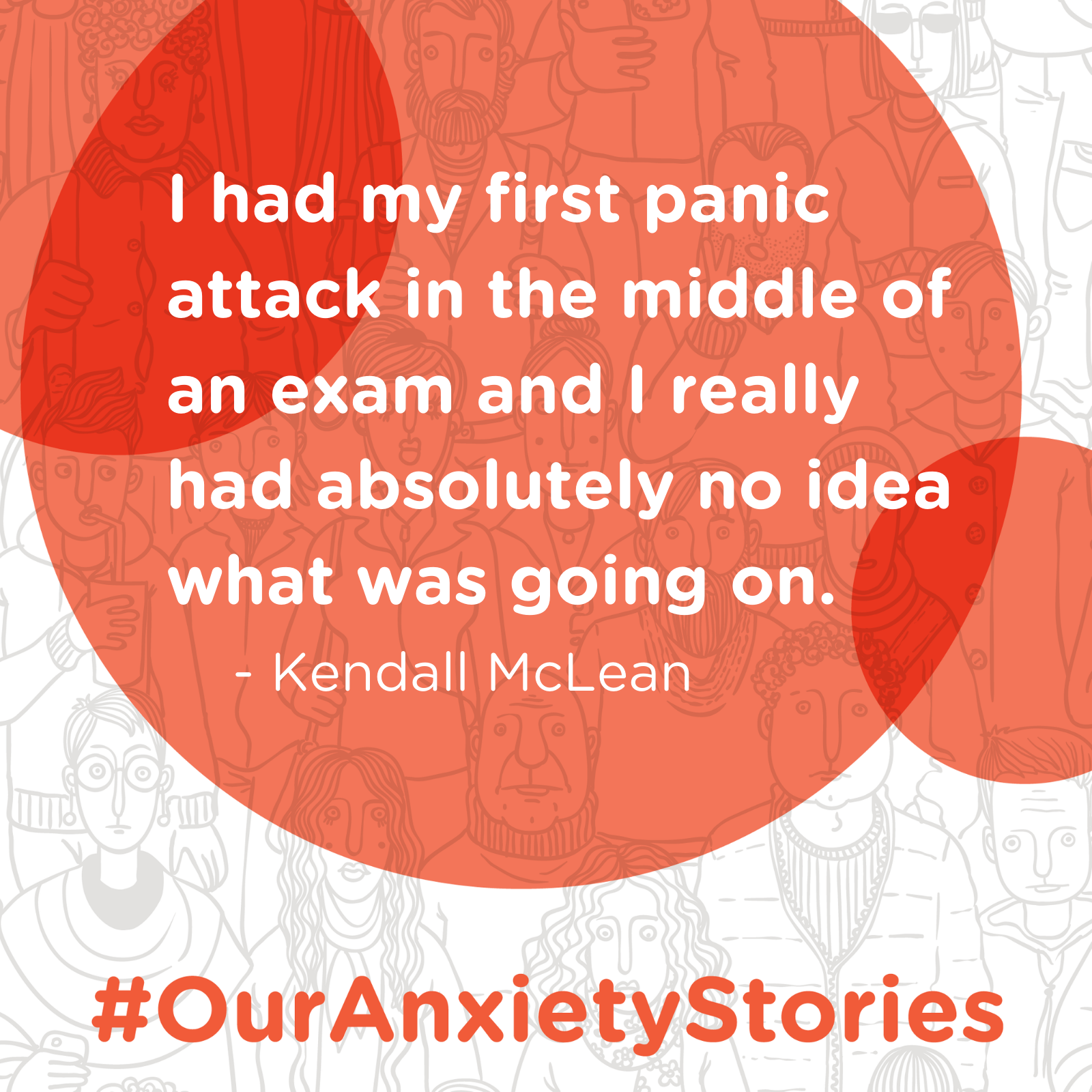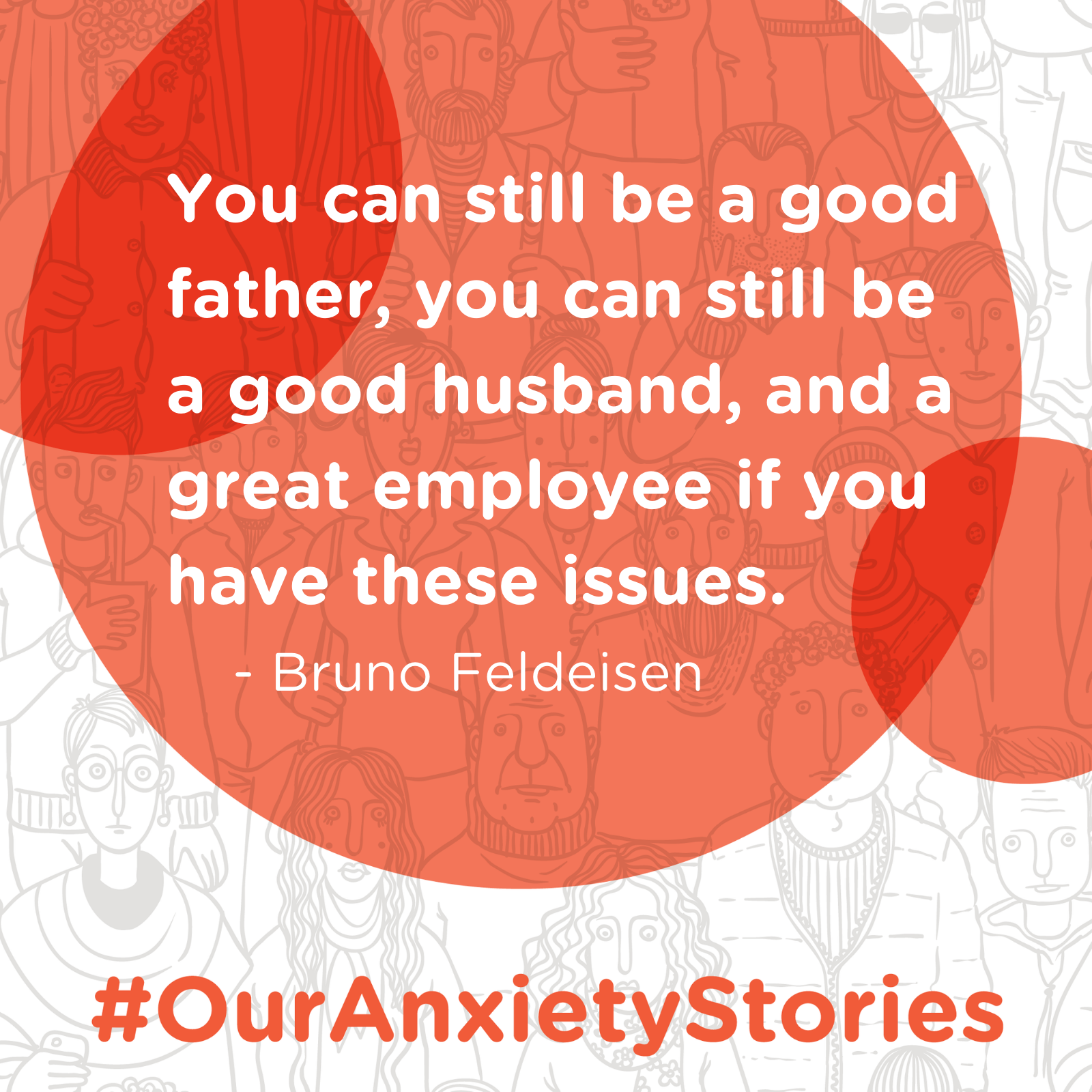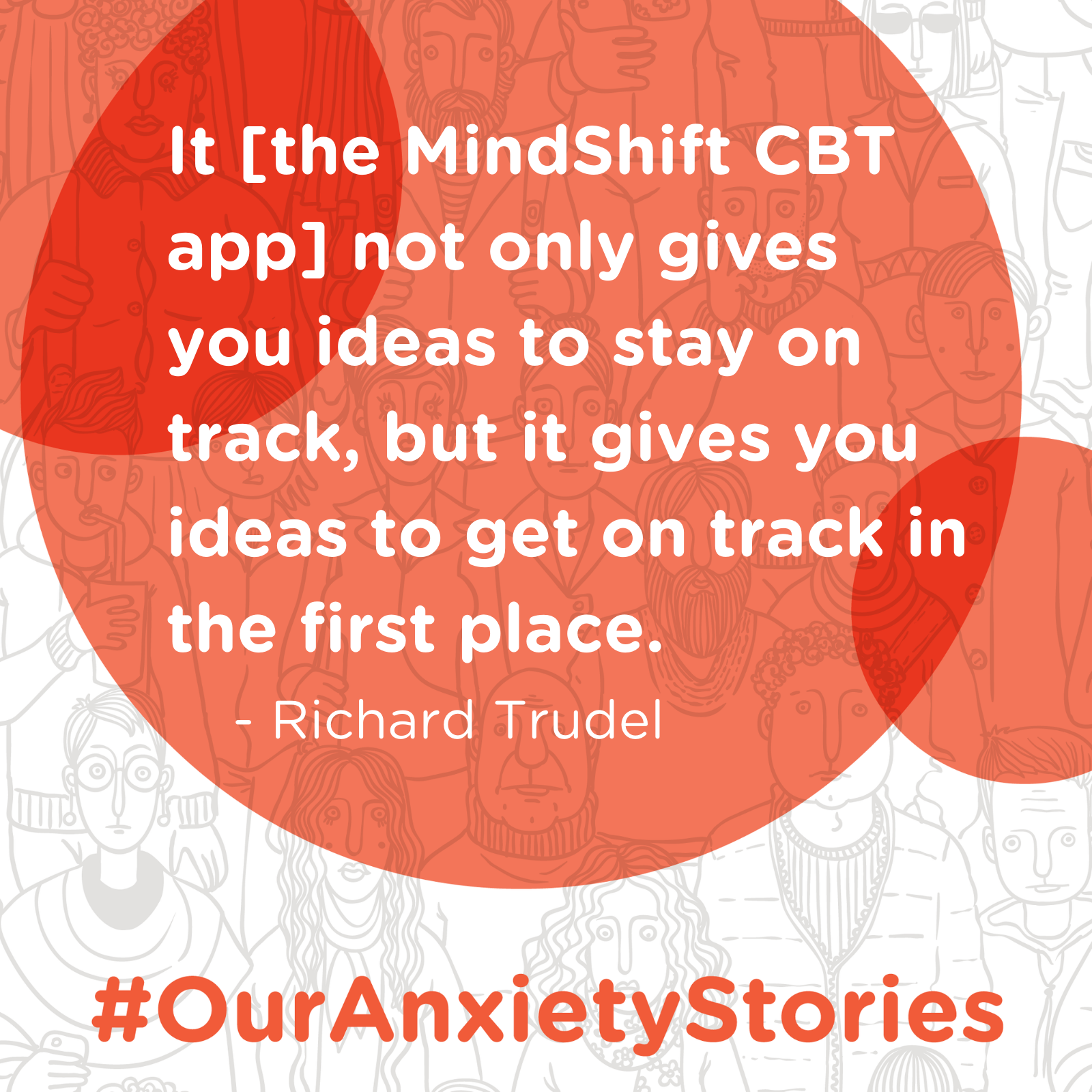Episode Transcript
Speaker 1 00:08 You are listening to our anxiety stories, the anxiety Canada podcast with John Bateman. Check out anxiety canada.com for more totally free anxiety resources, including our app mind shift at CBT.
Speaker 0 00:22 <inaudible>
Speaker 2 00:26 if this is a, it's John.
Speaker 3 00:28 Oh, thanks John.
Speaker 2 00:29 That's okay. No. Okay. Since you called me Chris, you'll forgive me for not knowing how to pronounce your last name. Uh, as, uh, let me get, wait. Oh. <inaudible>
Speaker 3 00:39 very close.
Speaker 2 00:39 Okay, let's hear it.
Speaker 3 00:42 <inaudible>
Speaker 2 00:42 Oh, Angela. Okay. Um, how are you doing today?
Speaker 3 00:46 I'm well. How are you?
Speaker 2 00:47 I'm doing fine. Thanks. Just just waiting in here, talking to all these people about their anxiety stories and a, and with that in mind, I'm, I'm heading off the, I'm starting off with my guests to talk to me about their anxiety story. It's in what, what is your anxiety story?
Speaker 3 01:04 Uh, it's, it's been a long, uh, it's been a long one. It's just silent suffering until I think my body just couldn't handle it anymore. And so the panic attacks started coming in quite frequently, but leading up to the panic attacks, um, and in that time of silent suffering, uh, there is just this notion of something's wrong with me because I just felt anxiety all the time. Uh, in social interaction, uh, having more of a public job I think was difficult because you're almost required to be an extrovert. And so meanwhile, like this would just exhaust me and I would do anything and everything, short of nothing to try to be social. Um, so that, that included trying to, uh, drink coffee and have caffeine or trying to drink alcohol and see if that would help me and nothing worked. Um, and it just perpetually got worse, uh, to the point that I stopped attending events that I should be at or birthday parties with your friends.
Speaker 3 01:59 And then slowly I stopped getting invitations to those. So then I just kept thinking everybody hates me. Um, and so all of that was happening in parallel to me just being very critical, uh, and, and genuinely thinking something's wrong. Uh, so I actually started creating a suicide plan, um, because I just thought there is nothing they could do to feel normal. And I had no medical, um, knowledge, uh, you know, prescribing that this could be something that most people feel and was not just, you know, something that I felt in isolation. Um, and so during the time, and it was about five years plan a rather extensive, um, I realized that my, my sister gave birth to two twins and I realized I fell in love with them. And that, that anchored me into saying, wait a minute, you know, creating a suicide plan. Well, I have a successful life and have people that love me.
Speaker 3 02:57 There's something off about, and maybe it's not something that's wrong with me and there's something that I can get help with and I'll go and speak to my family doctor about it. So that's kind of what kicked off this, um, knowledge of just educating myself that this is not something, again, wrong with me. And that anxiety is something that's felt commonly. Um, and so that journey of educating myself, uh, began kind of looking inward, uh, dealing with things I had never dealt with before. Uh, recognizing things in my behavior that were not helpful or healthy for me to, to do. Um, and just slowly from there started cracking up, you know, um, the support system that's required to tackle on something like mental health and something like anxiety disorder. Um, and so, so that was kind of how, how it all has kind of come to be for me. Uh, and now after doing that, I suppose that's been now a 10 year journey, five years of silence, suffering another five years just trying to, not want to kill myself to wanting to live and choosing that. So, yeah. Yeah. Um, that, that was tackling the panic and the agoraphobia, which I was diagnosed with, um, going through cognitive behavioral therapy. Uh, really anything that people would tell me to do. I was like, yes, I want to do this. I want to live, I want to be healthy. Um,
Speaker 2 04:20 how did I, just a quick question. How did you, cause you know, I talked to people who deal with mental health issues and, and they, you know, a lot of people, the first thing they do is they did go and research as much as they can and then they find a myriad of different solutions that work for a myriad of different people. Um, and so did, did you find that you tried stuff and it didn't work or how did it work? Because there's, there's a lot of different things you can do. You know, you can change sleep, you can change diet, you can meditate, you can do CBT, you can go to counseling. Um, how did you Wade through that and find out what worked for you?
Speaker 3 04:51 It was, it was kind of trial and error. I certainly knew how I liked to learn that, that grounded me. So I knew like what works for me and for me, uh, to kind of, uh, nurturing, um, resources, you know, talk therapy, things like that didn't necessarily work for me. I really at this point just wanted to get more of a grasp of what is going on biologically, what are triggers like just so reading about that was helpful. But during that process, the first person who told me anxiety was the same was oddly, it was actually Jian Ghomeshi she told me. Yeah. So he told me about his triggers and his <inaudible> his anxiety. And this was before, of course, everything hit the fan for him. Sadly, everything hit the fan for him. So that one resource I had suddenly became a trigger for me. And um, and that just perpetuated this like self-loading lack of worthiness and me just being critical with myself.
Speaker 3 05:48 Um, but that did open up the wording it to me and I started researching what that is and um, and to be honest, starting to a little bit about it more openly with my, my group friends that like my confidence that I've posted, there's two that really kind of helped me navigate that. Um, I think the, uh, the most helpful pipeline that was really successful for me, uh, was first not tackling anxiety head on. It was first developing the coping skills. Um, so my day to day life could be easier, right? And so I didn't want to dig deep because I didn't know what was there. But one thing I knew was that obviously my body is giving up on me. I'm starting to faint on flights and I'm having panic attacks to the point of, you know, them being very harmful in, in, in the social context.
Speaker 3 06:43 And so getting that mindfulness and that grounding techniques and strategies just to exist the day and still be able to operate at the human day to day, I. E. get up, go to work, get out of bed. These things were all very challenging. Um, that, that, that started from that. That was the healthy way for me to begin my journey. And once I was able to maintain those and exercises skills, whether it's breathing technique, mindfulness, um, meditation practices, um, writing in a gratitude journal, all of those things in pet, like working in parallel in cooperation with one another is what helps me just get to the point of, okay, I know how to live now day to day. And now I'd like to dig a little deeper into this panic and what is triggering it. And so then I began to CBT, uh, cognitive behavior therapy. Um, and, and while doing the CBT, I didn't, I didn't forego doing the other things.
Speaker 3 07:37 I kept doing those in co, like kind of in concert with one another after the CDT was complete. And it had finally allowed me not only to live in my, it was, I had the coping strategies like mindfulness meditation that helped me just not have a panic attack. CPT finally brought me to this moment in time to enjoy myself and to go to TIFF and be at festival parties without having massive panic attacks. But it actually allowed me to enjoy my life. It was, it was, Oh my God, I'm addicted now. This was my first test antics as one of my clients. So it was a person that actually got to enjoy the festival rather than be so, um, and unraveled by it. Yeah. And so now I'm, I'm currently in the process of, uh, digging deeper even from there and see, or what caused panic attacks to begin with.
Speaker 3 08:30 Yeah, I grew up, phobia was one of the triggers, but I was choose to no other thought out. So I began the trauma therapy program for women at women's health college and that, that is what I'm doing currently. So now I'm getting educated on biologically, you know, what, what, what is the function of our brain? Um, what does the amygdala do? Try to get triggers. And I think that that kind of knowledge helps us be kinder and more compassionate to ourselves cause they're like, okay, well, you know, it's not like there's some strange defect in our DNA. This is common. This is normal. This is the way the human body works. And these are the elements that lead to you, um, behaving in certain ways in social contexts. So, uh, the education has been helpful for me to, um, to really, you know, I do have to constantly toggle between finally enjoying myself in a moment or CDT, but through trauma, I have to keep going back into the history.
Speaker 2 09:33 Yeah, it's a good, yeah, that of course it is. But you're, you know, only when you're really in a good place to tackle that. Do you go and tackle that? And it sounds like that's what you've done.
Speaker 3 09:42 I've, I've created it to me, I created a business one
Speaker 2 09:46 interesting
Speaker 3 09:47 the work I create work schedules and
Speaker 2 09:49 I can see how CPT would work for you that way then.
Speaker 3 09:52 Yeah. So I, I created these milestones and intentions then and kind of a a this, this framework of how I'd like to tackle this really large issue that I know nothing about. And through that intentional design of how I'd like to go about it, I mean of course things have shifted here and there and I'm learning of new techniques and there is suddenly this openness, um, to hear other people's stories and try to see what works for me and none. Um, but that framework has kept me going cause I'm like, you know what, CBTS and 11 month program for me and I'm going to commit to that and after that I'm going to have some time and then I'm going to start trauma therapy. There is something almost guiding me through it because that initial research was done for me.
Speaker 2 10:34 Right. And you've used, have you used a mind shift app?
Speaker 3 10:38 I have. I use it. I mean, I use it prior to Allister and me even knowing it as a part of, uh, anxiety Canada, uh, I had downloaded it as a part of my CBT. I use it on a daily basis.
Speaker 2 10:49 Oh, great. Yeah. Yeah. That's, that's, yeah, it's turning into, seems like it's a, a really good, it's nice. I mean, what's beautiful though too also is it's a free resource too. Um, and I think that helps a lot. You know, I've downloaded meditation apps and so on and so forth, and you can only go so far before you have to start paying money. You know, for me, mental health is something that should be free, uh, to get mental health help. It should be free right across the board just because it's so, I mean, that's, that's what we are, we are creatures that are like that. So, yeah.
Speaker 3 11:20 I don't know why it's not more prevalent, uh, resources for mental health because like I live in downtown Toronto. So when I look out my, when I walk up my door and look out my window, there's homelessness all over the place. And for trying to tackle just the fate, the bare bones of homelessness, but providing more shelters. I don't know why we don't dig deeper and think, wait, there's mental health issues here. A lot of people go onto the streets cause there's, you know, um, satisfied or unrecognized mental health issues. Um, and when I think about that, that that actually is very disheartening. My brother had had schizophrenia, uh, he tried to kill my dad twice, which is what led to his diagnosis. He was toggling between being in prison and being out of prison in a restraining or it like, it took two years of me happening, his diagnoses for law enforcement to finally take it seriously because that took two years.
Speaker 3 12:13 You, the person that spoke English and understood, um, you know, legislation that, uh, understood that, you know, these, uh, mental health organizations or resources for us, for the community. And if they're not doing the job and we're not holding them accountable, people will fall out of that and we'll just go into like, you know, criminal acts or gangs or gun violence or substance abuse. Um, it took two years to diagnose my brother and it was only because I champion to him that he was able to succeed in it. If I didn't, if I gave up, which I wanted to do several times, he, he would be in and out of prison probably for the rest of his life. And I would not be surprised if he was one person that either commit suicide himself or went into a public space and killed others. Like that hot is not wild to me. I think that was a very real thought, which is what kept me going in pursuit of getting him the help he needed. Do you know what I mean?
Speaker 2 13:07 Yeah, I do. And you know what, uh, I'm gonna wrap up, but I'm going to tell you what you're doing in what we're doing here is, is part of this process. And I think it's great that we're here now, that the people are sharing their stories and you sharing your stories and incredibly powerful thing and um, it's all part of what we're building towards. So I really appreciate you talking to us about that and I, and I'm really happy that you've, you know, that you work through it and that you've found, uh, some way to start to cope with this because it's a, it's a difficult challenge.
Speaker 3 13:37 Yeah. It's like the Jaffe, it's that real and so I'm happy as well to get this far, but I, I also feel it's part of our job, like he said, to pay it forward and to try keep that space and resources for people who are, who are not there yet. We're still at that level of should I, can I, will I, how do I know?
Speaker 1 13:58 Yeah, for sure. Thanks very much for talking to us, Rosie. Take care. Thanks for listening to our anxiety stories, the anxiety <inaudible> podcast with Jon Beekman. Check out anxiety canada.com for more anxiety resources including our app Mindshift CBT. And if you like what you hear, please consider making a donation. This podcast is made possible by listeners like you. Until next time,
Speaker 0 14:28 <inaudible>.


